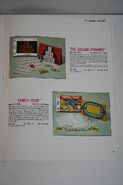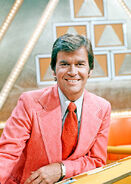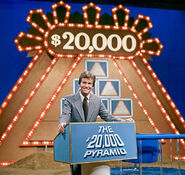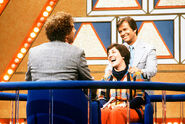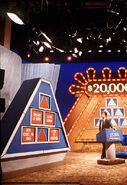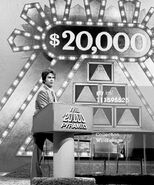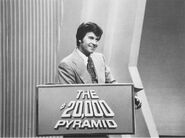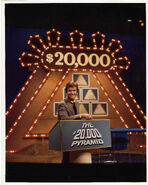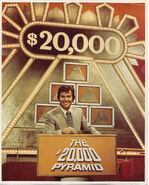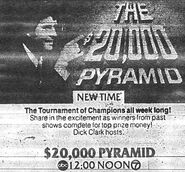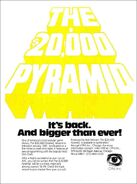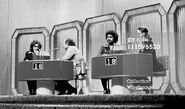No edit summary |
(Editing a gallery) |
||
| Line 164: | Line 164: | ||
$T2eC16ZHJHQE9nzEy8tsBRQHlWV90!~~60_57.JPG|February 06, 1978 |
$T2eC16ZHJHQE9nzEy8tsBRQHlWV90!~~60_57.JPG|February 06, 1978 |
||
The $20,000 Pyramid (April 20, 1978).jpg|April 20, 1978 |
The $20,000 Pyramid (April 20, 1978).jpg|April 20, 1978 |
||
| + | The $20,000 Pyramid (May 11, 1978).jpg|May 11, 1978 |
||
The $20,000 Pyramid (June 06, 1978).jpg|June 06, 1978 |
The $20,000 Pyramid (June 06, 1978).jpg|June 06, 1978 |
||
72312 622859031062211 1595322399 n.jpg|September 11, 1978 |
72312 622859031062211 1595322399 n.jpg|September 11, 1978 |
||
Revision as of 21:32, 27 January 2020
| Aired | |
| ABC Daytime, January 19, 1976 - June 27, 1980 | |
| Run time | |
| 30 Minutes | |
| Host | |
| Dick Clark | |
| Announcer | |
| Bob Clayton (1976-1979; His Death)
Steve O'Brien (1979-1980) | |
| Origination | |
| ABC Television Center (The Elysee Theater: TV-15) New York, New York | |
This is chronicling the 1976 version of The $20,000 Pyramid.
Game Format
Main Game
The game is played with two teams of two players (consisting of one celebrity & one contestant) in a game of word communication. Each game starts with the introduction of six categories arranged in a pyramid. In the main game, a category's position on the pyramid was not an indicator of its difficulty. The categories were usually puns hinting to the content within that subject.
Each team in turn chose a category, and then a subject under that category was given. Each subject has seven words/phrases/names. The team had 30 seconds to guess the seven answers that fit into the category. One player described each item while the other player tried to guess what the words are. Each correct word was worth one point. When a word was passed, it cannot be returned to, but if the guesser can guess the word already passed, the team still scored. If at any time the clue giver gave away any part of the answer or conveyed the essence of the answer, a cuckoo sounded and the word was thrown out.
Each team had three turns with the celebrities giving first in round one, the contestants giving in round two, and in round three they decided amongst themselves on who's giving and who's receiving.
Any team who achieved a perfect score of 21 points won a $1,000 bonus (a bonus prize in the final season).
Big 7
At some point in the game, a team would uncover a special item called the Big 7. The team that exposed the Big 7 had 30 seconds to get all seven and win $500 cash.
Tie-Breaker
If the game ended in a tie, the game shifted into a tie-breaker situation. The team that caused the tie had a choice between two letters leaving the other for the other team. Both teams had 30 seconds to get as many of the seven items beginning with their letter(s) as they can. The teams continued building on their scores using the tie-breaker categories. This caused an achievement of very rare high scores. Extra ties kept the game going, and as soon as the tie was broken, the game was over. The team with the most points won the game.
Winner's Circle
The giver of the winning team faced a larger pyramid board of six subjects with the guesser having his/her back to the board. The winning team had 60 seconds to climb up to the top of the pyramid by getting all six. On each subject, the giver gave a list of items that fit the subject while the guesser tried to guess what they all have in common. As soon as the guesser gets the right subject or passed, they moved on to the next subject to the right. Upon a pass, the team can come back to it if there's time leftover though the guesser can still get the subject without going back to it. If at any time the giver gave an illegal clue (giving away part of the answer, conveying the essence of the answer, descriptions of the category or a synonym) a buzzer would sound, the subject was re-concealed and the team forfeited the chance at the big money. The giver was discouraged from using his/her hands which is why they were strapped into the chair. Even though the big money was forfeited, the team can still go for the other subjects, because when time ran out, the contestant still won money attached to the subjects guessed; of course, getting all six in 60 seconds without illegal clues won the grand cash prize and retired from the show. Otherwise, he/she returned to play in the next game.
Payoffs
Here are the amounts for each subject:
| 1st | 2nd | 3rd | 4th | 5th | 6th |
| $50 | $100 | $200 | |||
The 1st try is worth $10,000, The 2nd try is worth $15,000 & The 3rd & All Tries are all worth $20,000. Winning here at any point augmented the winner's collected cash totals to the grand cash prize.
Merchandise
Board Games
Milton Bradley (1974 &1977-1979)
Five editions were made at the time.
Photos
Set Pics & Host
Print Ad
Trade Ads
Theatre Building
Production Slate
Press
Tickets
Contract
Episode Status
See Also: The $10,000/$25,000/$20,000 Pyramid/Episode Guide
Video

$20K Pyramid promo, 1978

$20,000 Pyramid - Billy Crystal's Winner's Circle Record

$20,000 Pyramid - Show 70 Billy Crystal CLASSIC RETRO GAME SHOW!
See Also
The $10,000 Pyramid
The $25,000 Pyramid
The $25,000 Pyramid (1982)
The $25,000 Pyramid (2010)
The $50,000 Pyramid
The $100,000 Pyramid
The $100,000 Pyramid (1991)
The $100,000 Pyramid (2000)
The $100,000 Pyramid (2016)
The $500,000 Pyramid
The $1,000,000 Pyramid (2000)
The $1,000,000 Pyramid (2009)
Pyramid (1996)
Pyramid (1997)
Pyramid (2002)
The Pyramid (2012)
Pyramid Rocks
The Junior Pyramid
Junior Partner Pyramid
All-Star Junior Pyramid






